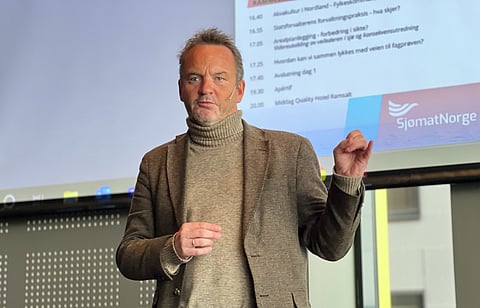

Geir Ove Ystmark, CEO of Sjømat Norge, here giving a lecture.
Photo: Øyvind A. Haram / Sjømat Norge.
Following the understanding reached yesterday in the Norwegian Parliament (Storting) on the aquaculture reforms proposed by the Government last April, the reaction of the national association of the Norwegian fishing and aquaculture industry has not been long in coming: "Sjømat Norge is pleased with the main elements of the agreement."
"We want to commend the parties that have come together in the work to develop regulations for a world-leading and sustainable aquaculture industry," said Sjømat Norge's CEO, Geir Ove Ystmark. "The Storting has concluded that the industry needs new regulations, but that more knowledge is needed about the different models that are on the table," he continued.
For the association, Norway's largest, which organizes a large part of the various sectors of the aquaculture industry, the predictability achieved with the agreement reached by the Norwegian Parliament's standing joint committee on industry is "extremely important."
As reported by WeAreAquaculture, a cross-party committee in the Storting this week discussed the White Paper 'The Future of Aquaculture - Sustainable Growth and Food for the World' presented in April by Norway's Minister of Fisheries and Oceans, Marianne Sivertsen Næss, and reached agreement on final proposals to be presented for a formal vote next week.
After the Aquaculture Committee suggested that company licenses should be continued, but that development should be governed based on the environmental impact at each site, the Norwegian government proposed a new management system, making it more profitable to operate with low environmental impact and good animal welfare in which company licenses would be phased out, and companies would receive quotas for sea lice emissions.
Now, the Storting has decided that both models should be further investigated before a final decision is made, and that an improvement of the current management model should also be evaluated.
The agreement was reached between the Labour Party (Ap), the Conservatives (H), the Centre Party (Sp), the Progress Party (Frp), the Liberals (V), and the Socialist Left Party (SV). Only the Green Party (MDG) and the far-left Red Party (Rodt) refused to sign.
As said, Sjømat Norge's positive reaction to the agreement has not been long in coming."It is important that the industry is not thrown into a dramatic restructuring, as proposed in the Aquaculture Report, without the consequences being examined. The Storting has understood that," its CEO said.
The seafood industry organization recalled that business licenses serve as collateral objects for companies, and that they are very important for the financial security of the sector. Therefore, within the industry and among many economists, doubts had been raised as to whether there was sufficient knowledge about the effects of eliminating company licenses.
"The Storting, like us, wanted to know more before making a final decision," Geir Ove Ystmark stated. The CEO of Sjømat Norge - the industry organization whose name can be translated as 'Seafood Norway' - believes it is important for the Storting to want a better knowledge base.
"We need a broader clarification of the extent to which sea lice in aquaculture affect wild salmon stocks," he said. "All the proposed management models are based on the assumption that sea lice from aquaculture have a significant impact. It is therefore important that we all have confidence in the knowledge base."
In its statement, Sjømat Norge also noted that it has had "good and constructive discussions" with most of the parties during the handling of the report, with mutual respect for the different main positions. The Association highlighted that all parties have shown a willingness to compromise, which is reflected in the agreement reached.
Nevertheless, while its CEO said that there is reason to congratulate all parties involved for the effort and willingness to cooperate that have made the agreement possible, he also noted that now is the time to delve more deeply into the details of the agreement.
"A broad agreement provides predictability, but it also means that the Storting is going further in certain areas than we would ideally have wanted," he said.
The organization has been skeptical, for example, that aquaculture has been given a quantified ambition of 5% mortality for farmed fish, in contrast to other forms of animal husbandry. It has also advocated a broader environmental flexibility scheme than the one now agreed.
In its reaction to the agreement on proposed aquaculture reforms reached by the Norwegian Parliament's standing joint committee on industry, Sjømat Norge also stressed that the Storting has called for the establishment of a Fisheries and Aquaculture Directorate.
"Aquaculture is one of the few industries that does not have its own specialized directorate. The administration is highly fragmented. This leads to long case processing times. Therefore, it is necessary that such a directorate is given sufficient authority to cut through," said CEO Geir Ove Ystmark.
The organization considers that, together with the rest of the agreed measures, assessing whether the Directorate of Fisheries should be given overall responsibility for the management of aquaculture within a Fisheries and Aquaculture Directorate will strength the industry governance.
"This is something the industry and Sjømat Norge have been calling for over a long period," the organization release states. "The agreement points toward an even more sustainable aquaculture industry, without undermining the value of the companies."
